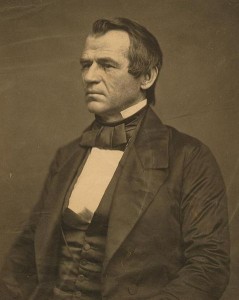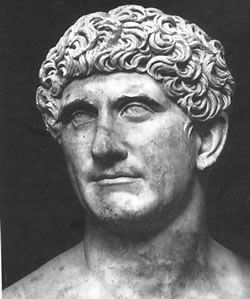150 years ago today Senator Andrew Johnson from Tennessee made a fired-up speech in the U.S. Senate. His jumping off point was a response to Louisiana Senator Benjamin’s departing words as he left the Senate as a result of Louisiana’s ordinance of secession.
From The New-York Times February 6 1861:
CONGRESSIONAL PROCEEDINGS.; SENATE. IMPORTANT FROM WASHINGTON.
WASHINGTON, Tuesday, Feb. 5. …
Mr. JOHNSON, of Tennessee, (Dem.,) said that in a former speech he had placed himself on the Constitution with the fathers, and against the doctrine of nullification and secession, which he considered to be a national heresy. As far back as 1833, he had planted himself on the same principles, and believed the doctrine of secession to be an enemy which, if sustained, would lead to the destruction of the Government; and he opposed this doctrine today, for the same reasons. He believed it would be the destruction, also, of any Government which might be formed subsequently. …
On yesterday we had quite a scene — a piece well played, gotten up to order, and the pieces well memorized — whether anxious mourners were prepared for the occasion, he could not say. The Senator from Louisiana (Mr. BENJAMIN) had argued that his State had violated no obligation, as she was not bought for a price, but had her sovereignty simply handed over in trust. He (Mr. JOHNTON) then read from the first article of the treaty of cession of Louisiana, claiming that it was explicit, that by the conveyance of absolute jurisdiction and control to the United States of the property and sovereignty, both were conveyed to the people of the United States. It was not, as represented by the Senator of Louisiana, any good will of the French, but the United States bought this property and sovereignty for so many million dollars. Then the Senator from Louisiana portrayed the enormity of the wrongs done to Louisiana, till he (Mr. JOHNSON) almost thought MARC ANTHONY came back, and expected to hear the Senator exclaim: “If you have tears to shed, prepare to shed them now.” What are these dreadful wrongs? The United States bought her, paid for her sixty millions francs, and then admitted her to the Union. Was any oppression and wrong there? Was there any wrong, when, at the battle of New-Orleans, Kentucky, who thanks to God stands firm to-day, and Tennessee, who he hoped will stand with Kentucky, went to the help and saved that city from Packenham? How much protection has she had for sugar? Is this another wrong? Then where are the wrongs which justify Louisiana to-day in leaving the Government, in violation of the rights of all the States of the Union? Without consulting even Kentucky and Tennessee, who defended her, she has taken the forts, arsenals and mint of the United States. …
He argued at some length the question of coercion, claiming a great difference between the enforcement of the laws, and what was called coercion of States. He quoted the Richmond Enquirer of 1814, referring to the Hartford Convention, and saying that no State had a right to withdraw from the Union, and that resistance against the law was treason, calling on the Government to arrest the traitors, for the Union, must be saved at all hazards. …
He said that South Carolina early had a prejudice against a Government by the people, and that secession was no new thing in that State. He referred to the early history of South Carolina, who proclaimed at one time that they were ready to go back under the dominion of King GEORGE. He read an address of the people of Charleston to King GEORGE, in 1780, saying that they never intended to dissolve that union; lamenting the struggle for Independence, professing affection for the Government, the King, &c., &c. He then referred to the attempt to break up the Government in 1833, by South Carolina. Then they were restrained and their pride humiliated…
What does South Carolina propose to give to Kentucky and Tennessee? All South Carolina wants of Kentucky and Tennessee, and the other States of the northern portion of the South, is to furnish men and money. When we find her prosecuting a contest for Mexico or elsewhere, Tennesseeans and Kentuckians will be very desirable to help in the battles. What protection can South Carolina give Tennessee and Kentucky, if her negro property needs protection? We have got the men, and we will have to pay for it, and not South Carolina, which has been an apple of discord in this Confederacy from my earliest recollection to this time, complaining of everything and satisfied with nothing. I think sometimes it would almost be a godsend if Massachusetts and South Carolina could be joined together, like the Siamese twins, and separated from the Government, and taken off into some remote, some excluded part of the ocean and fastened there, to be washed by the waves, and cooled by the winds, and after they had been there a sufficient length of time, the remainder of the people of the United States might entertain a proposition for taking them back. [Laughter.] For they seem to have been a source of dissatisfaction pretty much ever since the Confederacy was formed, and some operation or experiment of this kind, I think, would have a beneficial effect on them. …
You can read the rest of Andrew Johnson’s speech at The New York Times Archive
Andrew Johnson knows South Carolina (and the rest of the fledgling Confederacy) needs the resources of Tennessee, Virginia, etc.


